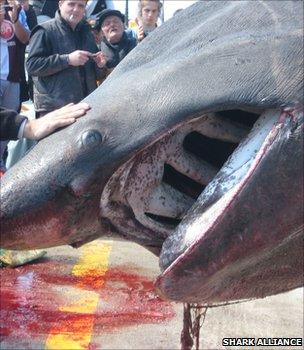Shark finning continues despite EU ban, says report
- Published

Current EU measures are not offering enough protection to sharks, say campaigners
Loopholes in EU regulations mean that illegal shark finning is continuing undetected, a report warns.
Finning involves cutting off a shark's fins and throwing the rest of the carcass back into the sea - a practice that the EU has regulated since 2003.
Marine experts are calling on the EU to stop issuing special permits that allow fishermen to remove fins at sea.
The authors say almost a fifth of shark, skate and ray species are classified as threatened.
"The waste and unsustainable mortality associated with finning pose threats to shark populations, fisheries, food security and the sustainability of marine ecosystems," said co-author Sonja Fordham, deputy chair of the International Union for Conservation of Nature's (IUCN) Shark Specialist Group (SSG).
"The most reliable way to enforce a shark-finning prohibition is to require that sharks be landed with their fins naturally attached to their bodies," she suggested.
"This method is being mandated for more and more fisheries, particularly in Central and North America, creating momentum for global change."
In the EU, shark finning is banned except where special permits have been issued that allows a fishing vessel to fin sharks at sea, without landing the entire animal.
Fin dining
Under the present regulation (1185/2003), member states are able to issue the permits to exempt fishing vessels from the finning at sea "ban".
Under the exemption, the weight of fins kept from the catch must not exceed 5% of the live weight of the shark catch.
However, the authors observed, the fins of some shark species did not typically represent 5% of the live weight of a shark, creating a loophole that meant finning could take place unnoticed.
Globally, sharks are captured in targeted fisheries for their meat, fins, liver and oil. However, it is the animals' fins that are prized as these command high prices.
In comparison, shark meat is relatively cheap, difficult to store and takes up a lot of storage space. This is why the practice of finning at sea is used - it allows vessels to harvest the valuable asset, dump the remaining carcasses, leaving storage space for more economically valuable fish stock.
Shark fin soup is a highly priced, traditional, celebratory, Chinese dish. Fins are considered to be among the world's most valuable fish products, fetching in the region of up to 300 euros/kg (£250/kg) in Hong Kong.
In contrast, shark meat retails for up to seven euros/kg (£5.80/kg) in European markets.
The report - Shark Fins in Europe: Implications for reforming the EU finning ban - was produced, the authors said, in order to highlight the weaknesses in the current system.
"For too long, the EU has left the door open to shark finning," said Uta Bellion, European co-ordinator of the Shark Alliance.
"This report reinforces our call on the EU Commission to propose legislation in 2011 with the one truly reliable option for preventing finning - a complete prohibition of the removal of shark fins at sea."
The European Commission is currently canvassing public opinion on whether the option to issue special permits should be revoked, external.
The consultation runs until February 2011, after which the Commission plans to submit a proposal to revise the current regulation to the European Council and Parliament for consideration.
In October, the UK government announced that it was going to stop issuing the permits that allowed vessels to remove fins while at sea.
On the Department for Environment, Food and Rural Affairs website,, external officials wrote: "This means that all UK registered vessels will now have to land sharks with their fins naturally attached, wherever they fish.
"We did not think that UK fishermen were engaged in shark finning, but wanted to take a strong position and make clear our support for 'fin-on' landings."